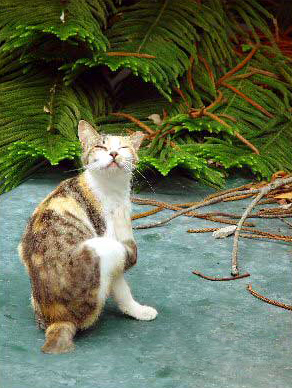|
Basic Cat care |
Cats are lifelong companions. Sharing your life with a pet is an important decision.
It is a lifelong commitment to your friend's well being. Cats will give you companionship,
entertainment and a lot of happiness, in return they require time, money and compassion.
Rather than treating your cat as a guest who visits from time to time please consider
him or her to be a member of your family. As with other members of your family cats
deserve loads of time, love and attention.
Please be sure you are prepared for the responsibility for more than 15 years.
|
|
|

|
Collars
All collars on cats are dangerous unless the collar has an elastic insert or is
the "breakaway" style. Cats can strangle if the collar gets caught on something,
or injure themselves trying to get the collar off. If you put a collar on a kitten
or growing animal, please be sure to check that it does not become too tight as
the kitten grows! If your cat goes outside, prevent the cat from killing birds by
adding a small bell to the collar.
|
|

|
Food
Do not feed your cat food made for dogs or use any dog care products on cats. Dog
food and "human" table food lack essential vitamins and minerals cats need such
as taurine - an essential amino acid for cats. Lack of taurine in the diet causes
blindness, serious heart problems (dilated cardiomyopathy), and may promote urinary
tract problems as well. Feed only well-balanced cat food, appropriate to the age
and activity level of your cat. Avoid dairy products! Dog flea preparations often
kill cats. Likewise, medications, shampoos and other products made for dogs (or
humans) can be toxic to cats.
|
|
|

|
|
|
|
|
|
|

|
Cleaners
Do not use phenol-based disinfectants or cleaners around your cat. Lysol, Pine-Sol
and similar products contain phenol. Please read all package ingredients carefully.
Phenol can cause serious liver damage in cats.
|
|

|
Medications
Be very careful, for example NEVER give your cat paracetymol or aspirin. These products
cause severe bleeding problems. Over-the-counter medications can kill cats. Use
only veterinary-prescribed medications.
|
|

|
Indoors
Please consider making your cat a strictly indoor pet. The list of risks to outdoor
cats include poison, injury (falls, cars, attacks by other animals or humans, or
broken glass), parasites (fleas, ticks, or worms), disease (feline leukemia virus,
feline immunodeficiency virus, feline infectious peritonitis, upper respiratory
viruses, etc.), and theft. . Keep your cat indoors, and you will have a healthier,
more socialized, and content family companion.
|
|
|

|
Indoor cats
Provide your indoor cat with toys and a scratching post, regular claw-clipping (we
do not recommend de-clawing!!! declawing), nutritious food, clean litter, fresh
water, and lots of love and companionship. You will both enjoy it!
|
|

|
Company
We recommend adopting two compatible cats, particularly siblings, as they form a
close bond and provide great company for each other.
|
|

|
Bringing
Bringing your cat home. Don't be surprised if she hides under furniture, or in a
cosy corner, for several days. Cats can take a while to adjust to their new surroundings
and new housemates.
|
|
|
|

|
Cats adopt well to life indoors and live long happy lives in apartments. Indoor
cats live longer, are healthier, suffer fewer injuries than outdoor cats.
Most dog owners know that running around the neighbourhood is not in the interests
of their pet and now cat owners are slowly beginning to realise this too. The average
life span of an outdoor cat is 3 years. When humans domesticated cats thousands
of years ago, the place of cats in our ecosystem changed forever. Cats are now completely
dependent upon us for food and shelter.
People imagine cats living natural happily lives but the reality is a short brutal
life centred around rubbish bins.
An indoor cat does not have to face these dangers:
|
|
|

|
Vehicles
|
|
|

|
Unfriendly dogs and other predators
|
|
|

|
Fights with other territorial cats
|
|
|

|
Intolerant Humans - Malicious people poison, shoot, steal, and throw hot oil and
chemicals on cats
|
|
|

|
Diseases such as Felv, FIV
|
|
|

|
Parasites, fleas, ticks
|
|
|

|
Poison - a significant danger in HK
|
|
|

|
Sickness from eating garbage
|
|
|

|
Dehydration in summer
|
|
|

|
Getting lost ... despite stories of miraculous long journeys to find their way home,
most cats are never found
|
|
|

|
|
|
|